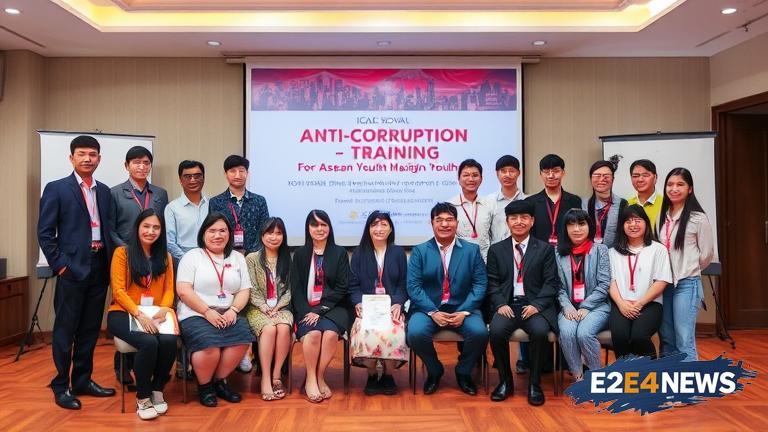The Independent Commission Against Corruption (ICAC) has made a significant stride in the fight against corruption by concluding its inaugural regional anti-corruption training for ASEAN youth. This groundbreaking initiative aims to empower the next generation of leaders with the knowledge and skills necessary to combat corruption and promote good governance. The training program brought together young individuals from various ASEAN countries, providing a platform for them to share experiences, best practices, and ideas on how to tackle corruption. The ICAC’s efforts to strengthen regional cooperation and capacity-building in the fight against corruption have been widely recognized. The training program covered a range of topics, including the principles of good governance, the consequences of corruption, and the importance of integrity. Participants also had the opportunity to engage with experts and practitioners in the field, gaining valuable insights into the latest trends and strategies in anti-corruption work. The ICAC’s initiative has been praised for its innovative approach to addressing corruption, which is a major obstacle to economic development and social progress in the region. By targeting young people, the ICAC is helping to build a strong foundation for a corruption-free future. The training program is also expected to have a positive impact on the region’s economic growth, as a reduction in corruption can lead to increased investment, improved business climate, and better public services. Furthermore, the ICAC’s efforts to promote anti-corruption awareness and education are crucial in preventing corruption from taking root in the first place. The commission’s work in this area is complemented by its efforts to support the development of effective anti-corruption laws, policies, and institutions. The ICAC’s training program has also highlighted the importance of international cooperation in the fight against corruption. The commission has been working closely with regional and international partners to share knowledge, expertise, and best practices in anti-corruption work. This collaboration has enabled the ICAC to stay up-to-date with the latest developments in the field and to adapt its strategies to address emerging challenges. The ICAC’s commitment to fighting corruption has been demonstrated through its tireless efforts to investigate and prosecute corruption cases, as well as its work to prevent corruption through education and awareness-raising activities. The commission’s independence and impartiality have been essential in ensuring that its work is free from political interference and that it can operate effectively without fear or favor. The ICAC’s training program has also emphasized the importance of transparency and accountability in government and public institutions. By promoting these values, the commission is helping to build trust in government and to ensure that public resources are used for the benefit of all citizens. In addition, the ICAC’s work has highlighted the need for a multi-faceted approach to addressing corruption, which includes not only law enforcement and prosecution but also prevention, education, and awareness-raising. The commission’s efforts to engage with civil society, the private sector, and other stakeholders have been instrumental in building a broad-based coalition against corruption. The ICAC’s training program has also demonstrated the importance of empowering women and girls in the fight against corruption. By promoting gender equality and women’s empowerment, the commission is helping to ensure that all citizens have an equal opportunity to participate in the fight against corruption. Overall, the ICAC’s pioneering regional anti-corruption training for ASEAN youth has marked an important milestone in the fight against corruption in the Asia-Pacific region. The commission’s efforts to build a strong foundation for a corruption-free future are expected to have a lasting impact on the region’s economic development, social progress, and political stability.





